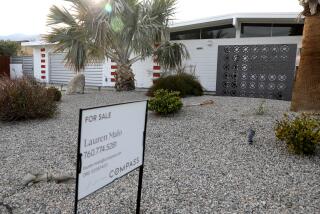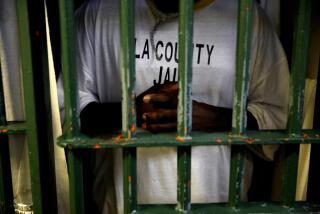Technological Quick Fix Has Unadvertised Cost
- Share via
The commercial begins with the woman entering her comfortable living room. She is blond, 30-ish, attractive and dressed in a bathrobe.
The phone is ringing and she walks over and picks it up. As she does, we see that she is wearing matching wedding and engagement rings, simple and elegant like the woman herself.
TV ads are very adept in their use of symbols. In just a few seconds we know a lot about this woman: She is mature and well-off and in the security of her home, but that bathrobe also makes her look very vulnerable.
She picks up the phone and says hello. The person on the other end does not speak.
Now, we see him. He is round-faced, wearing round, wire-rimmed glasses. He looks surprisingly ordinary and respectable.
“Who is this?” the woman asks, a faint note of annoyance in her voice. “Who is this, please?”
Finally, the man speaks. He speaks in a voice of quiet, almost playful, menace. “Why don’t you guess?” he says.
The woman knows what to do. She pushes a button on a strange box that we now see is attached to her phone. Instantly a number appears. It is the number of the caller.
The woman reads his number to him. “How’s that?” she says, triumphant. “Close enough?”
Then we hear a voice-over telling us that if we buy this new service from the phone company, “it can help you stop harassing calls.”
The commercial, as we have come to expect from phone companies, is extremely well done. The terror--the woman alone in her house, wearing a bathrobe, thinking she is safe--is controlled yet very real.
And the ordinariness of the caller is very clever. In its own way, the phone company is using Hannah Arendt’s famous concept about “the banality of evil.” The phone company is saying that the people who terrorize us can look very respectable. They can be the guy standing next to you at the department store counter who hears you give your phone number when you charge something, the man in the insurance office. Or your neighbor.
Evil people lurk everywhere and we are not safe from them even in our homes. So we must buy this device!
And, like most commercials, it leaves practical matters aside. Such as: What does the woman in the bathrobe do next? Call the police? And what does she tell them? That a man has called from such and such a number and has said, “Why don’t you guess?” Is that a crime?
The commercial does not trouble about such things. It offers a technological quick fix: You press a button on a box and your troubles disappear.
The box, which costs $60 to $80 plus about $6.50 per month, is called “Caller ID,” and it eventually will be available across America.
Some areas already have it. And the phone company portrays it as always being for the public good: It catches the bad guys, the heavy breathers, the obscene callers.
But others have raised serious objections to Caller ID. The Wall Street Journal gave the example of Eileen Hahm, a New Jersey social worker, who counsels disturbed, sometimes violent, patients. When she calls a client, she does not want that client to know her home number.
It’s a reasonable concern. And those who have non-published numbers, pay extra for it. But Caller ID reveals non-published numbers.
The phone company makes money both ways: It sells a service (an non-published number) and then sells a service that negates the first service (Caller ID).
The phone company says it is acting in the public good, helping to stop crank calls and false alarms. But it is also doing more.
Large companies have their own form of this service. Every time you call certain stores or businesses, your number is recorded and put in the company’s computer for future marketing. The company can then call you at home and pepper you with sales pitches. And it can sell your number to others.
American Telephone & Telegraph, MCI Communications and US Sprint Communications sell caller identification to businesses. And the seven regional Bell companies are trying to get people to buy Caller ID for their homes.
Some people, including consumer and civil liberties groups, are not all that pleased. They say whistle-blowing will stop. They say a person will be reluctant to call for confidential medical help or call a suicide hot line or call to report a neighbor for child abuse if their identities will be revealed through a phone number.
And in Maryland, a bill is pending before the state Legislature to block numbers from appearing on the Caller ID machines.
The phone company can do that. But the phone company does not want to do it. “Do we outlaw the peephole in the door?” a spokesman for Chesapeake & Potomac Telephone said.
The staff of the Pennsylvania Public Utilities Commission strongly opposed Caller ID last year, calling it a form of wire tapping. The commission approved it anyway.
In America, we never say no to technology. We never say no to “progress.”
The woman in the bathrobe is now safe in her home. She is secure in her privacy.
Until she picks up the phone and makes a call.
More to Read
Inside the business of entertainment
The Wide Shot brings you news, analysis and insights on everything from streaming wars to production — and what it all means for the future.
You may occasionally receive promotional content from the Los Angeles Times.










